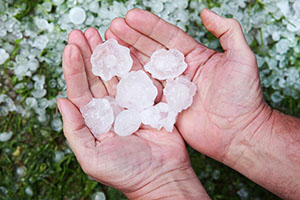Spring and summer storms sometimes bring an added surprise: hail. These icy missiles can range in size from a pea to a baseball, causing significant damage not only to cars, roofs, and vegetation but also outdoor equipment like your air conditioning unit. The National Weather Service reports that hail causes $1 billion in damage to property each year.
While cooling equipment manufacturers provide metal housing and wire caging to protect the parts inside, hail can still dent the outside, smash the metal fins in front of the condenser coil, and even dent and damage the fan inside.
The most common hail damage to air conditioners happens when hailstones hit or bounce up into the thin metal fins which direct the airflow in front of the coil. It’s easy to see where and how much damage there is, and it’s important to know that if you see bent fins, you’re seeing restricted air flow.
When air flow gets blocked, your air conditioner has to work harder for a weaker result. And because the whole HVAC system is many elements working together, when one part is damaged it eventually affects everything.
Results of hail damage and blocked airflow
- Your air conditioner will start running non-stop.
- You’ll notice an increase in your electricity consumption (read that, “higher energy bills”).
- The parts will have to work harder and therefore wear out more quickly.
- Worn out parts mean service visits and AC repair bills.
- Prematurely worn out parts mean a shorter lifespan for your system.
- A shortened lifespan means earlier replacement.
What to do if there’s hail damage
Some types of damage are more easily addressed than others. The slats or fins that cover the condenser coil are thin and flexible and easily flattened by hail. However, a heating and cooling technician can comb out flattened fins with a special tool. If the damage is too extensive, however, the fins may need to be replaced.
It’s crucial to note that if hail dents fans, they might still run, but their wobbling will cause long term damage. Large hail might also damage the aluminum or copper tubing system that runs through the condenser coil, break the connection of thermostat wiring, or rupture a refrigerant tube (and the recharging can be costly).
Need AC Help in the Portland, OR area?
Therefore, if you suspect any damage to your air conditioning unit at all, it’s best to have a qualified HVAC professional inspect your unit to determine whether or not there was interior damage.

